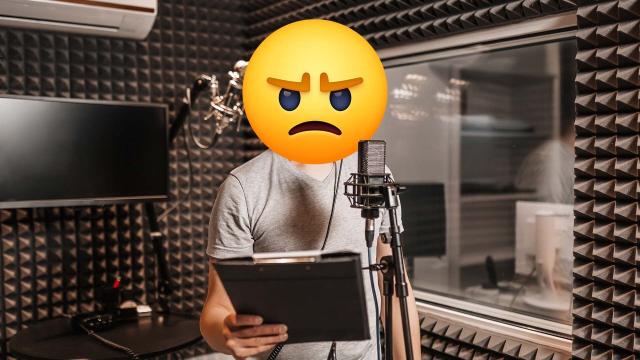After months of speculation from voice actors concerned with how their voices could be co-opted by AI, and recent announcements from companies like Ubisoft and Tencent that they’ll use NVIDIA’s new AI tools to provide voices for NPCs, the Screen Actors Guild American Federation of Television and Radio Artists (SAG-AFTRA) announced what it calls a “groundbreaking” new deal with an AI tech company. Unsurprisingly, the deal is far more complicated than SAG-AFTRA makes it seem—and it also appears to have been made without consulting voice actors themselves.
The deal with tech company Replica Studios pertains to the licensing and use of AI replicas of voices in video games and “will enable Replica to engage SAG-AFTRA members under a fair, ethical agreement to safely create and license a digital replica of their voice. Licensed voices can be used in video game development and other interactive media projects from pre-production to final release.” The deal reportedly has built-in safety nets for actors, like consent requirements, negotiation options, and the ability to opt-out of future use of the digitized version of their voices.
“Our voice actor agreements ensure that game developers using our platform are only accessing licensed talent who have given permission for their voice to be used as a training data set, as opposed to the wild west of AI platforms using unethical data-scraping methods to replicate and synthesize voices without permission,” said Replica CEO Shreyas Nivas in the statement. Kotaku reached out to Replica Studios for comment.
The press release also claims that this deal (which, as Aftermath’s Nathan Grayson pointed out on X, does not pertain to the “larger interactive media agreement” regarding voice acting and AI that is still in negotiation) was made with the approval of “affected members of the union’s voiceover performance community.”
To be clear: SAG-AFTRA members can choose whether they want to sign this deal or not, and it’s only specific to that one AI voice generation company. But based on the reaction from social media, it’s a fairly unpopular deal, and it’s currently unclear just how many of the “affected members” SAG-AFTRA contacted, as many prolific people in the community are claiming this is the first they’ve heard of it.
“Excuse me? With all due respect…you state in the article ‘Approved by affected members of the union’s voiceover performer community.’ Nobody in our community approved this that I know of. Games are the bulk of my livelihood and have been for years. Who are you referring to?” wrote voice acting icon Steve Blum (Diablo IV, Mortal Kombat, ) on X.
“I would humbly consider myself one of the top voice actors in games. No one asked me about this. No one reached out for my opinion. From what I’m seeing, no one asked any of my peers either,” posted Starfield actor Elias Toufexis.
“‘Approved by affected members of the union’s voiceover performer community…’ Uhhh, where and when @sagaftra???Wasn’t aware of this until *just* now and I’m the exact type of member you’re talking about,” wrote God of War: Ragnarok actor Shelby Young.
Others voiced their concerns over the details of the deal, which were not stated in the press release, while some pointed out that they don’t want their voices replicated by AI, but actually want to be a part of the game-making process from start to finish.
Kotaku has reached out to SAG-AFTRA for comment.
The chair of SAG-AFTRA’s interactive media bargaining unit, Sarah Elmaleh, did tell Grayson that the unit is “proud and grateful Replica pursued this bargaining process with us” while pointing out that “we still absolutely need a deal on the collectively bargained Interactive Media Agreement Proper. Obviously many developers will want to use the same technology directly themselves. Having clear and binding requirements around the transparency, consent, and compensation that Replica is in compliance of must be included in the fundamental agreement covering this work.”
With the ongoing enshittification of games production, where we’re just ten days into the new year and have already racked up an astonishing 2,300 layoffs in the industry, it’s not all that surprising that developers and publishers are looking for new ways to cut costs. While the Replica deal may seem like it’s above-board, it still poses the question: Do voice actors want their voices to be replicated by AI?

Leave a Reply